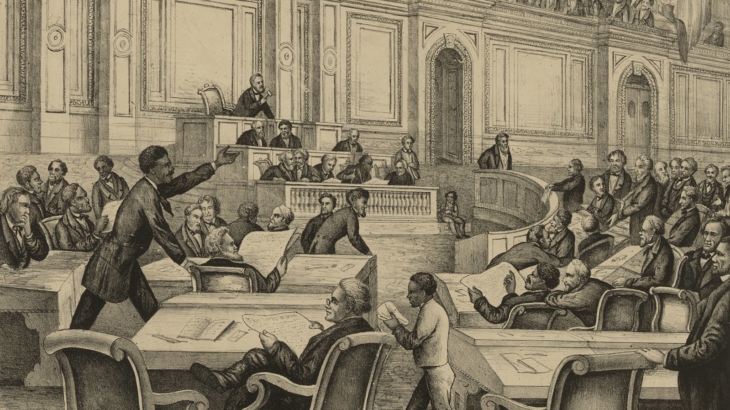Essay 62: Parliamentary Eloquence In The United States (Vol. 2 Pt. 1 Ch. 21)

Essay Read by Constituting America Founder, Actress Janine Turner
The essays in our study reference the following edition of Democracy In America: University of Chicago Press – 1st edition translated by Harvey Mansfield and Delba Winthrop. Today’s essay references pages 472 (start at Chap. 21 heading) – 476 of this edition of Democracy in America.
Modes of political behavior run along the grooves of the larger habits of the social organism. Call it culture, if you will. De Tocqueville, in his chapter on political eloquence in the United States, compares the European aristocratic mode to the American democratic mode. Before we examine De Tocqueville’s discussion, two digressions.
Eloquence conventionally means “fluent or persuasive speaking” and is used today to indicate objective oratory talent. If now we say “The Congressman spoke eloquently” we tend to mean finely. But the origin of the word is the Latin “e” for out [as in “exit”] and “loqui” to speak. The French word is “éloquence”, and the English word is borrowed from this mother language. In French, “éloquence” can also mean raw loquacity and volubility. I take De Tocqueville’s meaning to be mainly the method of speaking out rather than the finer quality of it.
In the 1986 hit comedy “Back to School” the protagonist, Thornton Melon, fumbling for words to ask his professor — who at least sounds European — out on a date, says “Call me sometime when you have no class.” This joke is funny precisely because America, in its prohibition of titles of nobility, is, in more ways than one, a classless society.
Few things show this more clearly than a common American method of fraud, which is to assume the air of European class structure to gain some advantage. A fine illustration of this comes from Mark Twain’s Huckleberry Finn.
After one fraud introduces himself to Jim as the Duke of Bilgewater, his companion ups the ante: “Bilgewater, I am the late Dauphin!” Hilarity ensues as the Duck and the Dolphin carry out various fraudulent schemes as Jim and Huck make their lives in America great again by floating their way to Cairo and freedom, the essence of America that until then has eluded them both, Jim as a slave and Huck as a minor in the custody of a violent drunkard.
Returning to our main discussion, De Tocqueville observes that in the European parliaments a member of an assembly draws his station from the aristocratic structure. This creates a habit of subordination which quietly informs a politician how to behave. Particularly, it causes him to subordinate to party claims rather than to the direct interests of those he represents and have elected him. He cares only a little about the loss of his seat because his sense of himself and his worth is bound up in his station which exists independent of his elected political life. For the most part he says little of interest, and has little interest in saying much.
The American politician De Tocqueville describes has an entirely different view of himself. The American representative depends upon those who elected him for his status. He is self made by virtue of his election to office and is unmade by the loss of his office. As a consequence, party is secondary to the American politician, and his outspokenness is directed towards impressing his constituents and towards fighting for his constituents’ narrow, often openly selfish, interests.
The curiosity of the American politician about his constituents is perhaps only exceeded by his constituents’ curiosity about him. According to De Tocqueville “The population of a district charges a citizen with taking part in the government of the state because it has conceived a very vast idea of his merit. Since men appear greater in proportion as they are surrounded by smaller objects, one may believe that the opinion held of the agent will be higher as talents are rarer among those he represents.” Ouch.
In short, De Tocqueville’s opinion of most American constituents is little higher than Mark Twain’s view of the townspeople along the river who pay to see Jim painted blue and exhibited as a “sick Arab” or to see the thoroughly fraudulent play, The Royal Nonsuch, produced by Bilgewater and the late Dauphin.
It’s not flattering. American electors, De Tocqueville says, expect that their representative will be an orator, and that he will speak not just on behalf of the country but zealously on behalf of their interests. This is his eloquence and the essence of his outspokenness.
“He will speak often if he can, and that in case he is forced to refrain, he will strive at any rate to compress into his rare discourses an examination of all the great affairs of state joined to an exposition of all the little grievances they themselves have to complain of,” says De Tocqueville. Emphasis is my own.
The words of the Frenchman wound but it is hard to escape notice that such behavior is the epitome of today’s more talented members of the House of Representatives.
But all that De Tocqueville says is not insulting. He closes by noting the inferiority of the deliberations of aristocratic nations, which focus on “particular times” and “the rights of a particular class.” Debates in the democratic assemblies of America somehow through all the aforementioned defects are more interesting than those of Europe.
“I see nothing more admirable or more powerful than a great orator discussing great affairs within a democratic assembly. As there is never a class that has charged its representatives with asserting its interests, it is always to the whole nation in the name of the whole nation that one speaks. That enlarges thought and elevates language.”
From De Tocqueville’s low estimation of American outspokenness comes high praise indeed.
As the French say, C’est bon!
 J. Eric Wise is a partner in the law firm of Alston & Bird.
J. Eric Wise is a partner in the law firm of Alston & Bird.
Click here to receive our Daily 90-Day Study Essay emailed directly to your inbox.
Click here for the essay schedule with today’s essay and previously published essays hyperlinked.



Hello! I’m Janine Turner, founder of Constituting America!
“I see nothing more admirable or more powerful than a great orator discussing great affairs within a democratic assembly. As there is never a class that has charged its representatives with asserting its interests, it is always to the whole nation in the name of the whole nation that one speaks. That enlarges thought and elevates language.”
I think this quote of De Tocqueville is worthy of contemplation! In our democratic town halls, it’s the blend of what we want individually and also how it serves the community as a whole. This is the beauty, the integrity, the exceptionalism, and the challenge for Americans, isn’t it!